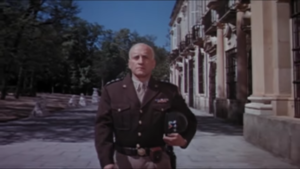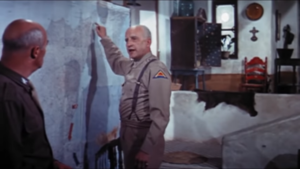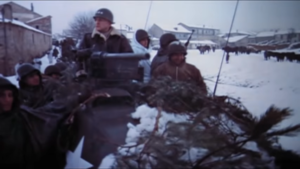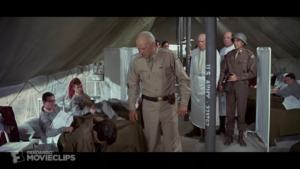Rating: 5 out of 5





Coming from a military town, I have been around the military most of my life. My father was a career military veteran. He has always stated that the United States has consistently produced some of the best and finest military leaders the world has ever seen. His opinion, not mine. He used to quiz me all the time to name some military generals. I used to start off with the easy ones like George Washington and then almost many Civil War generals. My dad used to tell me that the generals in World War II were the special ones. The leadership of Eisenhower during D-Day, the military brilliance of MacArthur, the calm-headed Bradley, along with being the Chief of Staff Marshall. Yet, my dad’s eyes lit up when he thought about Patton or as he liked to say, “One of the craziest and aggressive SOB generals the world has ever seen.” I remember my dad sitting me down and having me watch Patton at a young age, but my attention span really didn’t last too long. Fast forward many years later, and here we are. My dad was correct, Patton was one of the craziest and aggressive SOB generals the world has ever seen.

For many years, I thought George C. Scott was actually the real-life version of George S. Patton. If anyone deserves major credit and honor, it is George C. Scott, for this performance. Scott was phenomenal as the late general and gives him a stage that he would love to have. Actually, Scott makes Patton more memorable with this performance than many other formal generals. Just the way Scott carried himself through this film made him so believable. A genuine hard a**. Someone you wouldn’t want to be under command, but yet you know you might live. Every time Scott was on screen, he was big, powerful, brilliant, and one of a kind. Always wearing a three-star general’s helmet with a little whip in hand. His raspy voice and half-crazy smile, barking orders to everyone. Scott truly played the role and became “Old Blood and Guts” himself. Bravo, Mr. Scott. The world shall salute you for this performance.
If director Franklin J. Schaffner wanted to make a statement with the opening of his film, he did it in the most American way possible. Having a giant a** American flag in the background. Slowly, Patton walks up on stage in full uniform, before greeting his men for one of his famous speeches. This one monologue seemed to set the tone of this whole movie. As Patton stated, “We’re not just going to shoot the bastards; we’re going to cut out their living guts and use them to grease the treads of our tanks.” or later on in his speech, “I don’t want to get any messages saying that we are holding our position. We’re not holding anything. Let the Hun do that. We are advancing constantly, and we’re not interested in holding onto anything except the enemy.”

Patton’s speech seems to be inspiring but lets his men know that he means absolute business, and there will be nothing holding him back from glory. One of the best examples of this was when he first gets command of the American II Corps in North Africa. The corps is lackadaisical and doesn’t seem to care that much. As Patton arrives early and walks through the grounds, his men quickly know he is not one to be messed with. He commands everyone to wear their helmet and have their pants on. When a doctor questions him about his helmet because he can’t use his stethoscope, Patton simply replies, “You better drill two holes on the side” before leaving. When he is also talking about air support and the camp is suddenly attacked, he jumps out of the window onto a truck and starts shooting at the planes. Completely CRAZY!

That is what this film is all about, the involvement of Patton in World War II. He seemed to one of the best field commanders the world has ever seen, gaining praise from his colleagues for his battle knowledge and being feared by the Nazis. Yet, the things that he couldn’t control was his ego and love for battle. Patton’s love for the battle is what gets him in trouble the most. As he states, “All my life I’ve wanted to lead a lot of men in a desperate battle.” He does that in the first half of the movie as his corps seem to be unbeatable because he is racing against Montgomery to free the city of Messina. He does this in glorious fashion, yet with glory comes downfall. During his next assignment, while visiting a hospital, he sees a kid who is afraid and shell shock. Patton loses his mind and gives the young soldier what I like to call the Kevin Hart Slap: “Yo Gonna Learn Today” Slap. Patton didn’t slap the kid once but twice while screaming, “I won’t have a yellow bastard sitting here crying, in front of these brave men who have been wounded in battle. Don’t admit this yellow bastard. There’s nothing wrong with him! I won’t have sons-of-bitches who are afraid to fight stinking up this place of honor! You’re going back to the front, my friend. You may get shot, and you may get killed, but you’re going up to the fighting. Either that or I stand you up in front of a firing squad.”
 After being in the doghouse for a while and losing command of his corps, Patton gets another chance because his mind couldn’t fathom someone like him being on the sidelines of the Great War. When he gets his chance, he takes it and runs with it. Crushing all enemies yet still being as egotistical as ever. The story shows that during a meeting with other generals, one commander asked how long it would take his Third Army to give a counter-attack. Patton’s response was he could attack in 48 hours. With the belief in his men, they marched and did what others deemed impossible.
After being in the doghouse for a while and losing command of his corps, Patton gets another chance because his mind couldn’t fathom someone like him being on the sidelines of the Great War. When he gets his chance, he takes it and runs with it. Crushing all enemies yet still being as egotistical as ever. The story shows that during a meeting with other generals, one commander asked how long it would take his Third Army to give a counter-attack. Patton’s response was he could attack in 48 hours. With the belief in his men, they marched and did what others deemed impossible.
Patton holds up in the world today. Not because it is a historical film about one of the best generals in American history. It holds up today because of the performance of George C. Scott. A man who embodied the soul of Patton and put him front and center for the world to see.